General
Nkrumah’s Legacy, Influence on Future Generations Endures
Published
1 year agoon
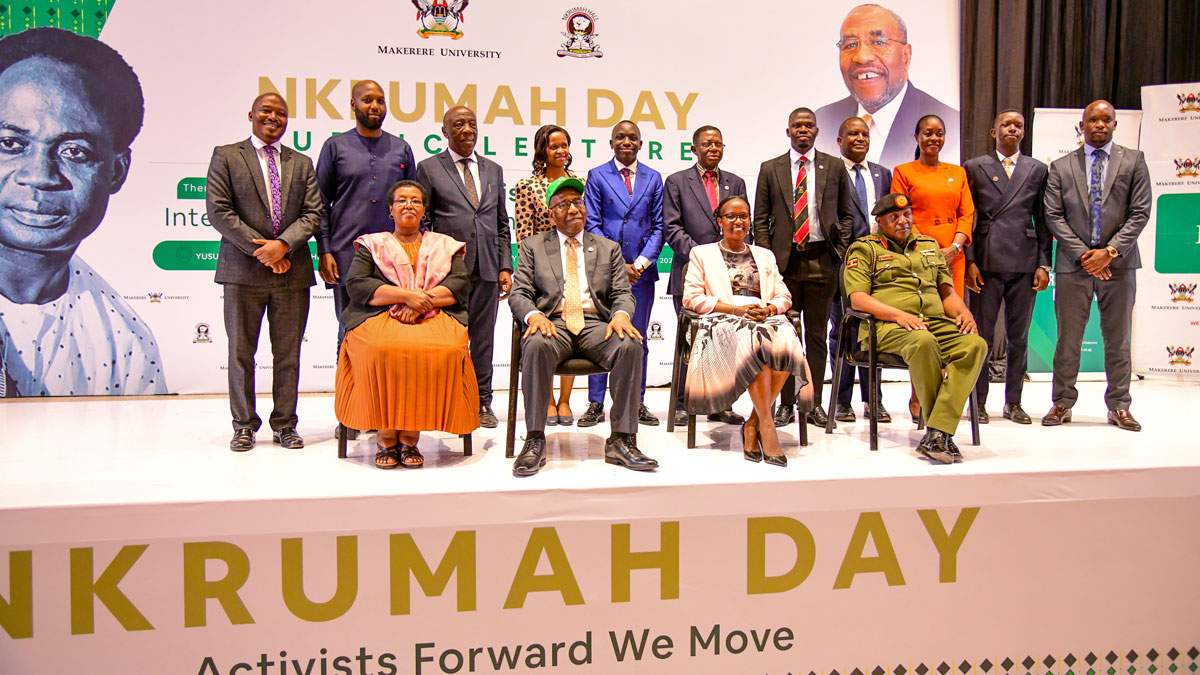
By Ritah Namisango
On September 21, 2024, the walls of the Yusuf Lule Auditorium at Makerere University reverberated with tributes of the powerful legacy of Kwame Nkrumah, a titan of Pan-Africanism and a visionary leader whose influence continues to shape the aspirations of the African continent. As the university celebrates the 70th anniversary of Nkrumah Hall, tribute was paid to titan’s unwavering commitment to African unity, as students, scholars, and dignitaries gathered to reflect on the profound impact of his ideals.
This momentous occasion which featured a public lecture and celebrations at Nkrumah Hall grounds, was a resounding call to action for today’s students and young people to embody Nkrumah’s dream of a unified and independent Africa. With the weight of history on their shoulders, speakers such as Rt. Hon. Dr. Ruhakana Rugunda inspired the audience to envision a future where African nations stand together against the forces of division and exploitation.
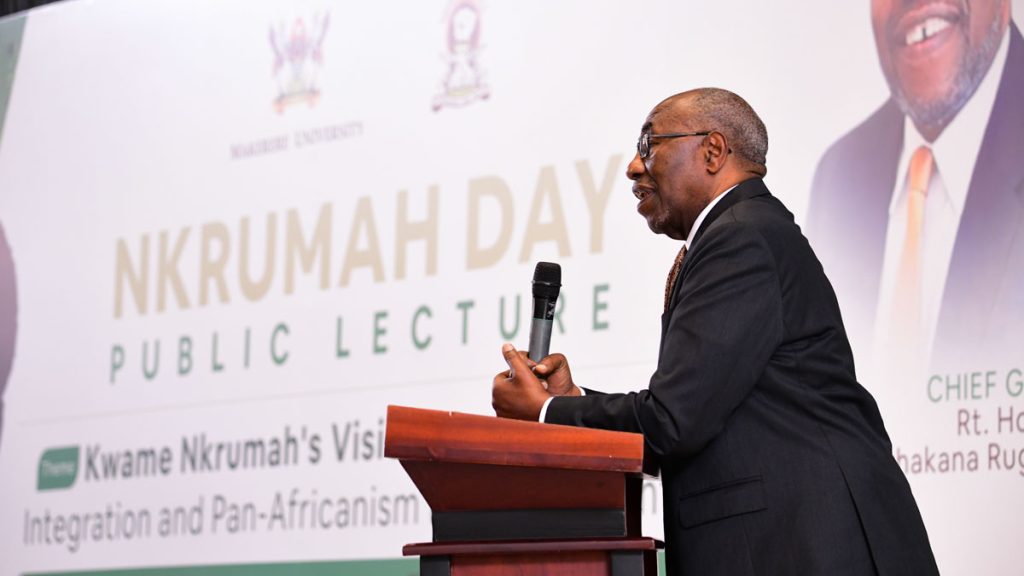
Dr. Ruhakana Rugunda, Prime Minister Emeritus and special envoy of His Excellency the President of Uganda, urged the younger generation to embrace the legacy of Kwame Nkrumah in the pursuit of a unified and independent African continent, calling for collective action in the face of adversity.
He highlighted Kwame Nkrumah as a prominent African leader and a pivotal figure in the quest for African unity. He emphasized that African continental agreements are a direct outcome of the philosophy of Pan-Africanism and African unity that Nkrumah championed during the challenging times when many African countries were still under colonial rule.
Dr. Ruhakana Rugunda noted that there is much to learn from Kwame Nkrumah, but what stands out most is his unwavering commitment to seeing Africa united, free, and independent—determining its own destiny, making its own decisions, and achieving enlightenment. He stressed that Nkrumah’s vision for a united Africa was rooted in the belief that political and economic cooperation among African nations is vital for achieving true independence and sustainable development. He argued that colonialism and imperialism can only be effectively confronted through unity and collective action.
“Upon Ghana’s independence in 1957, Kwame Nkrumah stated that the freedom of Ghana would be meaningless unless it was linked to the liberation of the entire continent. To this end, he ensured that Ghana served as a political and military base for training African freedom fighters to prepare for their respective nations’ liberation. This commitment inevitably created tension between Nkrumah and several oppressive colonial regimes across Africa, but he remained resolute in his mission. Ultimately, his efforts gained significant momentum,” Dr. Rugunda remarked.
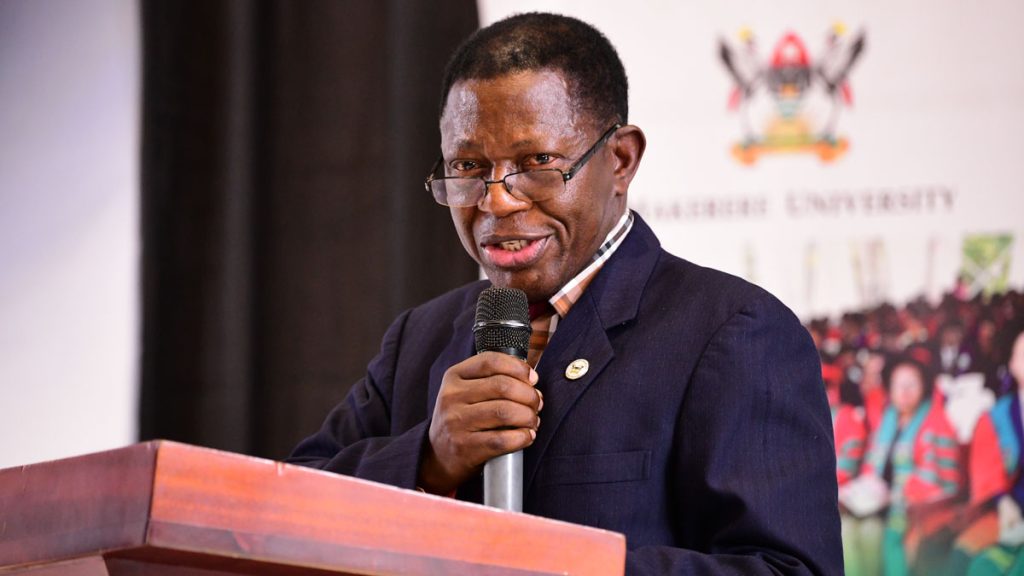
Dr. Ruhakana further highlighted that Nkrumah, alongside his political party, the Convention People’s Party (CPP), collaborated with numerous freedom fighters and Pan-Africanists both from the diaspora and within the continent. He emphasized the mutual influence among these leaders, which propelled their shared causes forward. Dr. Ruhakana identified key allies such as Julius Nyerere (Tanzania), Gamal Abdel Nasser (Egypt), and Patrice Lumumba (Democratic Republic of the Congo), along with Dr. W.E.B. Du Bois from the diaspora. He noted that Dr. Du Bois, the first Black individual to earn a PhD from Harvard University, was dedicated to connecting the diaspora with the African continent. He was also a pivotal intellectual leader in the struggle for African American rights and equality.
He explained that Nkrumah recognized how colonial powers aimed to weaken and divide Africa in order to exploit its natural resources and people, leading to the enslavement of Africans while developing other parts of the world. This exploitation served the interests of others, rather than those of the African people. Consequently, Nkrumah understood that Africans needed protection.
“Nkrumah realized that without protection, Africans would continue to be exploited. He asserted that Africa must unite. He authored a classical text titled ‘Africa Must Unite,’ in which he passionately articulated the importance of trade and collaboration among African nations. Even 45 years ago, his insights into the dangers of colonialism and neo-colonialism, which he described as the final stage of independence, were profoundly relevant,” he stated.
“President SékouTouré of Guinea declared Kwame Nkrumah co-President of Guinea—an honor I have not heard being bestowed upon anyone else in the world. His special duty as co-president was to champion the cause of African liberation. He had previously done so in Ghana, and President Sékou believed he would do it again. A year later, in 1967, Nkrumah organized the All-African Peoples’ Conference in Accra, resolutely inspiring the struggle for independence and liberation across Africa,” Dr. Ruhakana Rugunda noted.
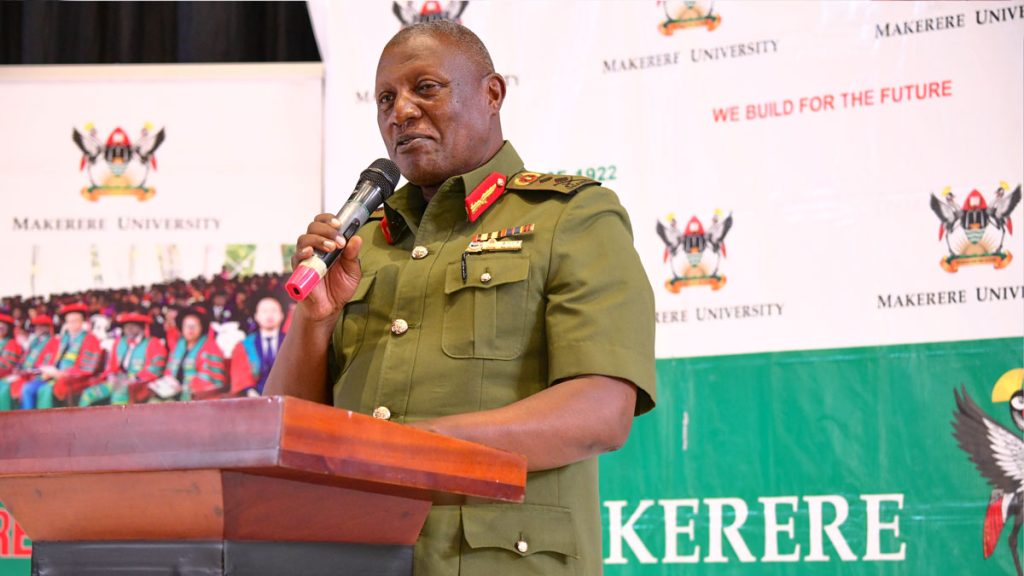
Reflecting on his time at Makerere University, Dr. Ruhakana Rugunda shared that he joined the institution in 1969 as a medical student under the chancellorship of Mwalimu Julius Nyerere, a distinguished alumnus of Makerere. At that time, the university was relatively small, and had only a few halls of residence. He was assigned to a hall known as New Hall, which was later renamed Nkrumah Hall in 1970.
Dr. Ruhakana Rugunda emphasized the significance of the renaming of the New Hall. He recounted that when he joined Makerere University, there was considerable student activism that mirrored the broader movements both in Uganda and across the African continent. The struggle against colonialism was intensifying, and Africa was on a path to liberation, with Kwame Nkrumah serving as an iconic figure in this quest. He was a leader who dedicated Ghana’s resources to the collective benefit of the continent.
“So, the students at New Hall convened in the Senior Common Room and passed a resolution to give New Hall a name that honored its significance. The name selected was Nkrumah. This resolution was passed overwhelmingly, and I am proud to have been part of that decision. The name Nkrumah was then forwarded to the warden and the university administration, who accepted it. That is how the name came about. I am also glad to see that there is an appropriate statue in front of the hall, commemorating an iconic figure in Africa’s history,” Dr. Ruhakana Rugunda remarked.
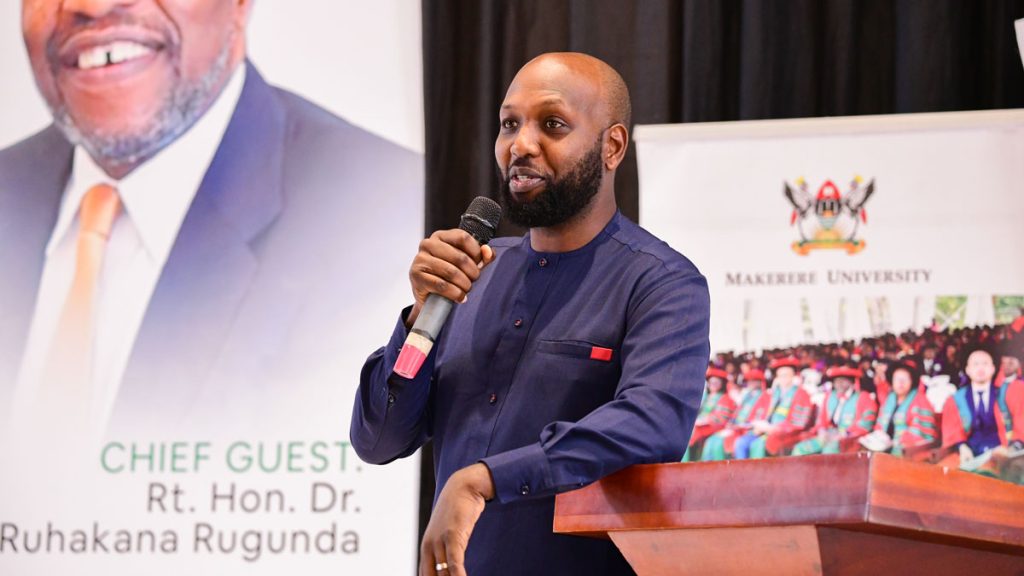
He urged the audience to continually add value to the teachings and philosophy of Kwame Nkrumah in order to support the independence, self-determination, and decision-making of the African people, as well as to promote their unity. He emphasized that unity is essential for harnessing Africa’s vast natural resources, which are often exploited by others. He commended Makerere University for hosting the event and suggested that it should become an annual celebration.
“I would like to express my gratitude to Makerere University and the leadership of Nkrumah Hall for organizing this event and fostering an environment conducive to symposia and discussions of this nature. I recommend that this become an annual event to ensure that more students and the general public are reminded of the vision, ideals, and significant contributions of the iconic Pan-Africanist Kwame Nkrumah and what he advocated for,” he concluded.
Reflecting on the colonial powers’ efforts to weaken and divide Africa, Maj. Gen. Henry Masiko, Chief Political Commissar of the Uganda People’s Defense Forces (UPDF), remarked that Africa was treated like a cake, with its resources plundered and controlled. He noted that Nkrumah recognized that independence would be meaningless without addressing the distortions, particularly the issue of division.
“Nkrumah understood the four essential goals of independence, which can be summarized as five key objectives: First, ensuring that liberation is not exclusive to a select few. Second, that Africa must be free, as the struggle in many places was for immediate independence. Third, it is not enough for people to be free, they must also prosper. Nkrumah viewed the prosperity of the African people as a crucial aim of independence. Fourth, reassembly of Africa as one united entity. Lastly, the need to recover African dignity, heritage, culture, and identity. He fully grasped these five objectives and was especially passionate about the reintegration of Africa,” Maj. Gen. Masiko stated.
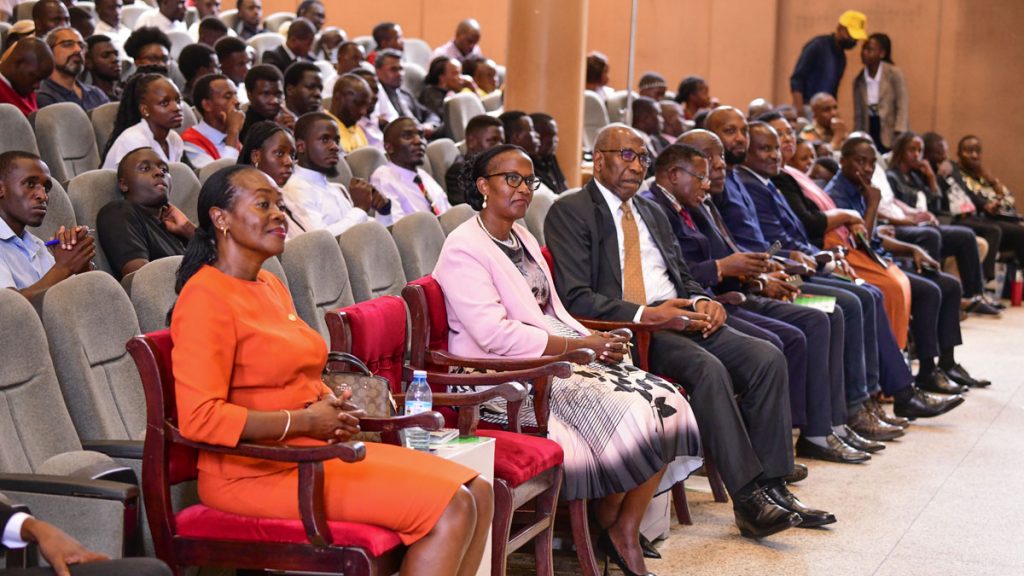
In his description of Africa, Maj. Gen. Masiko referred to it as the cradle of humankind, a continent rich in resources and the origin of civilization. He emphasized that Africa pioneered civilization, boasting of great empires like the Ghana Empire, the Mali Empire, and the Timbuktu civilization. Despite this, he noted that over the last 600 years, Africa has found itself at the bottom of the global hierarchy, regarded as the most marginalized and despised continent. He pointed out that this represents a contradiction that intrigued heroes namely Kwame Nkrumah and his compatriots.
“Africa, glorious in many ways, is now seen as the last. They understood that this decline resulted from a combination of mistakes and natural challenges that led to disastrous outcomes. The first disaster was the enslavement of our people, forcibly shipped away and scattered across the globe. This was a degrading catastrophe, as many Africans were reduced to the status of slaves. Following the horrors of slavery came the further degradation through colonization, which devastated Africa,” Maj. Gen. Masiko lamented.
As a champion in the formation of the Organization of African Unity (OAU), Maj. Gen. Masiko highlighted that Nkrumah’s dream during the founding meeting in Addis Ababa was to establish a United States of Africa (USA). According to Maj Gen. Masiko, Nkrumah urged all those gathered in Addis Ababa to leave their individual flags behind and raise the flag of a united Africa, advocating for one president, one army, and one government. He even expressed his willingness to step down as President of Ghana if other leaders would agree to form a unified African government in Addis Ababa. While he envisioned a cohesive and united Africa, today we still find ourselves categorized as the Fragmented States of Africa (FSA)! He reiterated that as we gather to commemorate Kwame Nkrumah, we must embrace his dream of unity.
“Kwame Nkrumah had a dream of reuniting Africa, and we must return to that vision. It remains relevant today. Nkrumah leaves us with the challenge he could not fulfill, but his spirit lives on. Imagine that reality of a unified Africa—why not? Perhaps in your lifetime, you could serve as a commander of the United Forces of Africa or serving in the federal government for the continent. That dream should not be regarded as in vain,” Maj. Gen. Masiko stated.
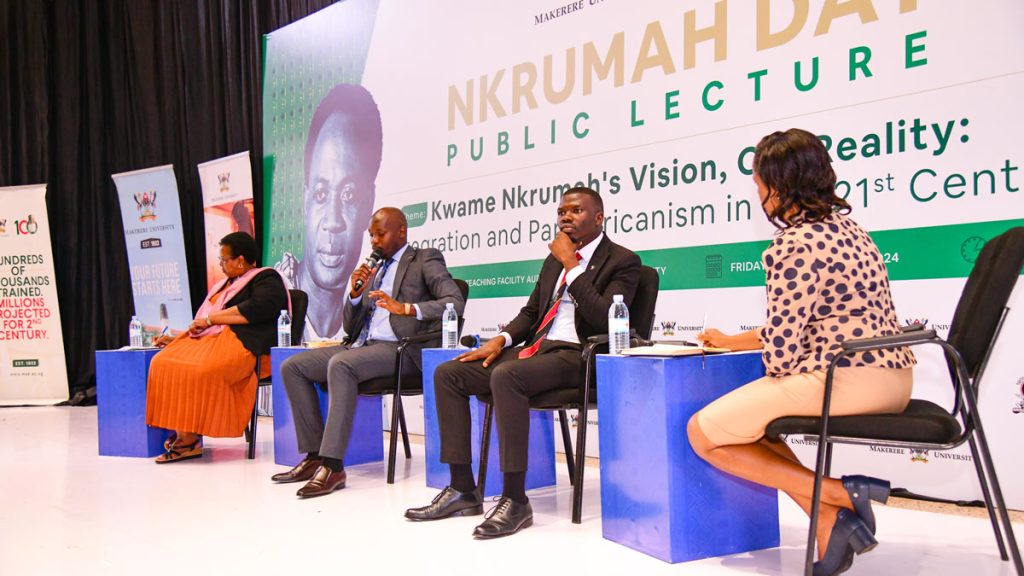
Reflecting on the Berlin Conference, which resolved to scramble and partition the continent, Maj. Gen. Masiko noted that European colonialists spent four months – from November to February devising ways to divide and share Africa among themselves, with no African representatives present at that meeting. He suggested starting a symbolic initiative by declaring these months as a “Months of Disaster” for Africa.
“The meeting in Berlin took place over November, December, January, and concluded in February. So why don’t we designate these four months as African Month of Remembrance for the disaster that occurred in Berlin? We could preach about and condemn the outcomes of the Berlin Conference while wearing black ribbons on our shoulders. I believe this could help awaken Africans to the reality of that disaster,” he proposed.
He revealed to the audience that there is still hope for Africa to reunite, citing a notable example: if Berlin, a city once divided to form East and West Germany, was reunited after the fall of the Berlin Wall, why can’t Africa, which only has imaginary borders, do the same? He thus urged the younger generation to carry forward the gospel of unity as Kwame Nkrumah did.
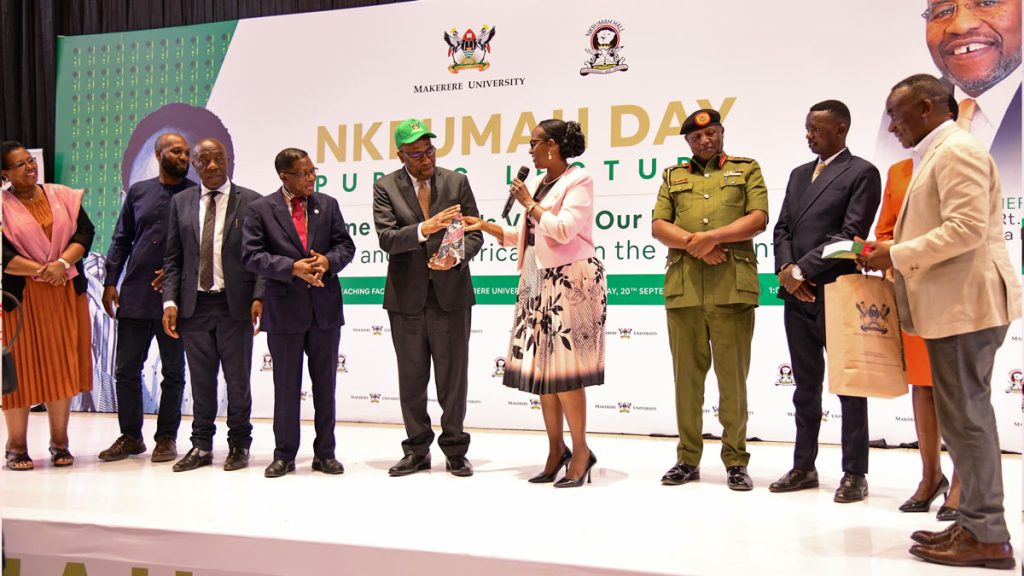
“The same Berlin was divided, not by rivers or natural boundaries like ours, but by a brick wall that separated Germany. I don’t know how many years they spent as East and West Germany, but they eventually woke up, broke down the wall, and reunited. For us Africans, since 1884, there have been no brick walls. So, young people, if we are unhappy with the divisions that exist, what should we do? I often hear phrases like ‘porous borders.’ Who told you there are porous borders? Porous implies there are holes, but these are merely artificial, imaginary colonial lines in your minds, and you call them porous borders,” he highlighted.
Discussing regional integration, particularly the East African Community (EAC), which currently comprises seven member states, including South Sudan, and the Democratic Republic of Congo (DRC), he shared his experience visiting refugee camps in Uganda. He noted that most of the refugees in these camps were from South Sudan and the DRC. He questioned the efficacy of the EAC by asking, “How can members of a community be refugees within their own community?”
In her speech, Mrs. Lorna Magara, Chairperson of the Makerere University Council, emphasized that Kwame Nkrumah’s vision for a politically united and economically independent Africa is as relevant today as it was during his lifetime. As a champion of Pan-Africanism, Nkrumah advocated for a united front against colonialism and the self-determination of African nations. Mrs. Magara asserted that Nkrumah’s dream extended beyond Ghana; it encompassed the aspiration for the entire continent to unite as one.
“Kwame Nkrumah was a great and charismatic man who inspired the fight for independence for Africa. His vision for a politically united, economically independent, and socially equitable Africa is an ideal we must integrate into our educational culture, social, and political environments. Today, we learned of Kwame Nkrumah’s tremendous influence and how he inspired the change of name from New Hall to Nkrumah Hall. Listening to these stories reaffirms the importance of intergenerational conversations to inspire the young generation to live by conviction and for a greater cause,” she said.
She called for a renewed commitment to Nkrumah’s ideals, particularly among the youth, who represent the future of Africa with 73% of Uganda’s population under the age of 17. She said that it is crucial to inspire the next generation to embrace the values of unity and cooperation that Nkrumah championed. She encouraged young people to engage in conversations about their history and the legacies of those who fought for their freedom.
“There is a growing and urgent need to prioritize these conversations, where values and norms are communicated from one generation to another. The recent population census statistics recorded that 45,900,000 Ugandans, out of which 73% are under 17, and only 5% are above 60. With these statistics, there is an incredible opportunity and also a challenge to influence the most significant percentage of the population. The idea of passing on values and knowledge from the old to the young through conversations and storytelling, like we used to do in the past, is the heart of this effort. This is one of the reasons why this engagement of bringing our esteemed alumni to engage with current students is of great importance,” Mrs. Magara stated.
Mrs. Magara proposed the establishment of “Ekyooto,” a fireside discussion for young people to engage in discussions about Nkrumah’s vision and explore ways to actualize it in today’s context. She emphasized the importance of bridging the generational gap and empowering the youth to carry forward the torch of unity and purpose.
“We have begun having what we call “Ekyooto” where young people and university students, come around to discuss these matters. I have a proposal that from this discussion, we have a ‘kyooto’, to articulate together with our elders what we need to do, to actualize the ideals of Kwame Nkrumah and his colleagues.We have to bridge the gap. We talked about passing on the baton, and we heard that Kwame Nkrumah picked the baton from his elders,” she said.
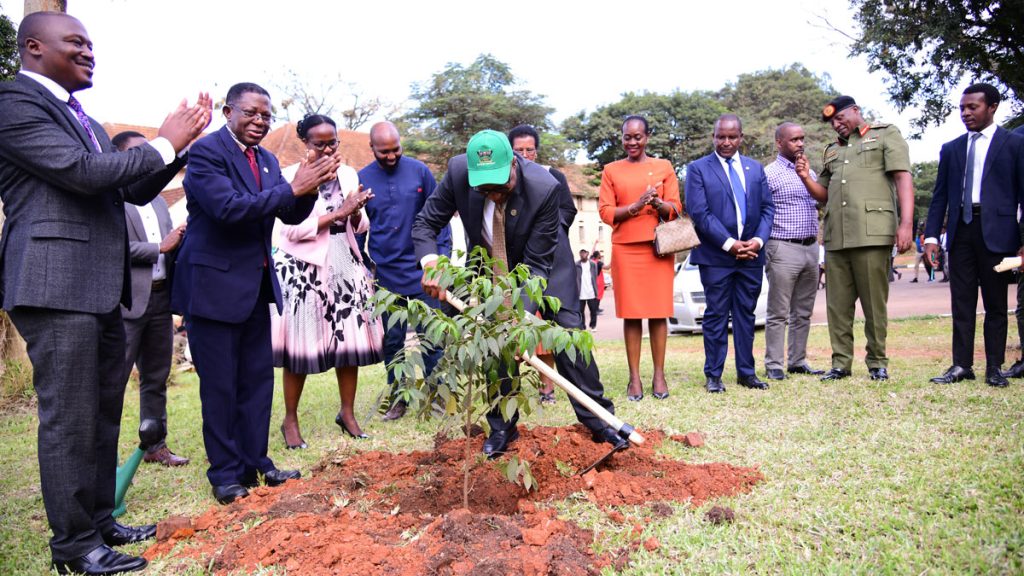
In today’s digital age where social media significantly shapes the cultures and attitudes of the young generation, often to the detriment of their mental and social well-being, Mrs. Magara emphasized the importance of prioritizing mentorship and guiding students toward purposeful living. She expressed particular delight, acknowledging the efforts of students, especially the chairperson and her council, in initiating the vital dialogue. Mrs. Magara urged them to remain curious about the history and the narrative of the African continent as well as the legacies of the great leaders who fought for independence and shaped the society we have today.
Mrs. Magara expressed her gratitude to all participants for their dedication to preserving Nkrumah’s legacy. She said that their presence was a testament to their commitment to the shared cause of preserving and promoting Kwame Nkrumah’s legacy whose ideals are vital for shaping a future where Africa stands united and strong.
Prof. Buyinza Mukadasi, the Acting Vice Chancellor of Makerere University, reaffirmed that Kwame Nkrumah remains a symbol of African pride. His vision and hope for a united Africa continue to inspire leaders across the continent and instill pride in Africans regarding their heritage and identity. He commended the students and residents of Nkrumah Hall for organizing the event, with support from the Office of the Dean of Students.
“I am very much delighted to join you all in celebrating the legacy and the day of birth of our African icon, the late Kwame Nkrumah. It is an indication that his ideals and legacy continue to inspire these generations. And for this, we shall be grateful for his contributions and his works for eternity,” he remarked.
Prof. Buyinza Mukadasi credited the Guest of honor, Dr. Ruhakana Rugunda for his contribution towards good leadership and revolutionary ideas. He also welcomed him and Maj. Gen. Henry Masiko back to Makerere University, their alma matter.
With profound pleasure, Dr. Winifred Namuwonge Kabumbuli, the Dean of Students at Makerere University, remarked that the name Kwame Nkrumah has stood the test of time, resonating like a beautiful horn across the African continent and beyond. She emphasized the importance of focusing on Nkrumah’s views on integration and Pan-Africanism that he championed and articulated to address the challenges of our time.
“Nkrumah saw all those things and realized that there was a need to have home-bred solutions to address the challenges of Africa in order to have a stable and strong nation. Therefore, this symposium aims to honor the legacy of Kwame Nkrumah as well as inspire a new generation of leaders to work towards a strong, prosperous, economically and politically strong African nation.
Kwame Rugunda, son of Dr. Ruhakana Rugunda and named in honor of the great Pan-Africanist Kwame Nkrumah, acknowledged the responsibility young people have to continue the work laid down by previous generations of Africans. He reiterated that while Kwame Nkrumah is celebrated as the father of Pan-Africanism, he also inherited the baton from earlier Africanists who championed the ideals of unity and cooperation across the continent.
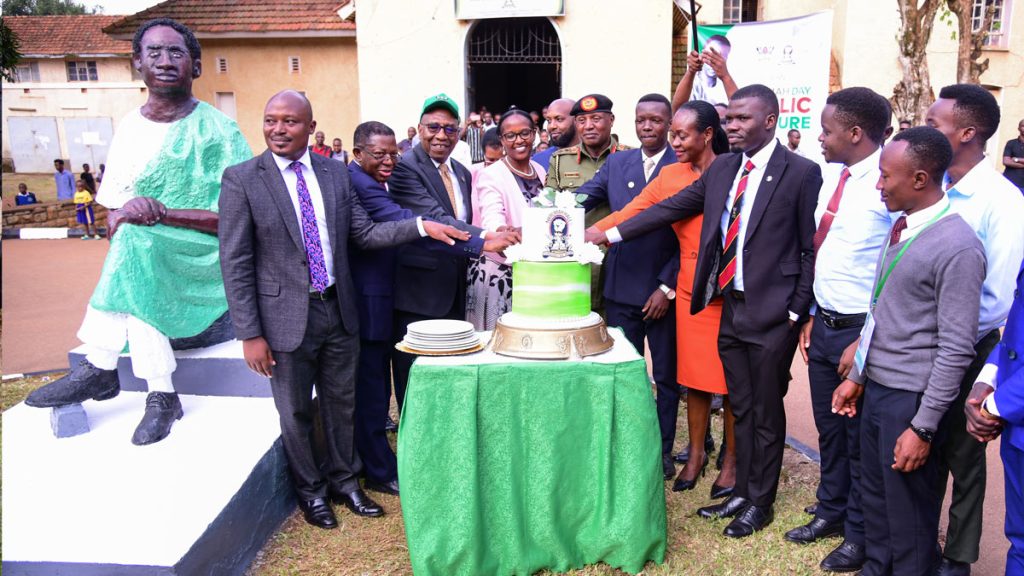
“Kwame Nkrumah picked up the baton from a previous generation, leading Ghana to independence in 1957 and continuing the vital work of Pan-Africanism. As a remarkable champion for the continent, he eventually passed the baton to the next generation, including leaders like Dr. Rugunda and others. Our task as young people is to receive this baton and carry forward the significant mission of advancing the African cause,” Kwame Rugunda emphasized.
He called upon young Africans to contribute actively to the ongoing struggle for their destiny, unity, and Pan-Africanism. “If there is one lesson to take away from today, it is the importance of learning from those who came before us and playing our part in advancing the African continent. We must not look to the West or the East for our direction; we are the architects of our own destiny,” he concluded.
The celebration of Kwame Nkrumah at Makerere University serves as a poignant reminder of the enduring legacy of one of Africa’s greatest visionaries. His unwavering commitment to Pan-Africanism and unity continues to inspire generations, urging us to confront the challenges of our time with a collective spirit. As leaders and students reflected on Nkrumah’s ideals, it became apparent that the path to a truly independent and prosperous Africa lies in our hands.
You may like

The 76th Graduation Ceremony of Makerere University will be held from Tuesday 24th to Friday 27th February, 2026. A total of 213 PhDs (87 female, 126 male), 2,503 Masters (1,087 female, 1,416 male), 206 Postgraduate Diplomas (80 female, 126 male), 6,343 Undergraduate Degrees (2,999 female, 3,344 male), and 30 Undergraduate Diplomas (9 female, 21 male) will be graduating from all the Colleges.
Ms. Sarah Aloyo and Ms. Nakato Dorothy both students of the Bachelor of Procurement and Supply Chain Management emerged as the best in the Humanities and Best Overall students with a CGPA of 4.93. Mr. Ssewalu Abdul, a Bachelor of Leisure and Hospitality Management student emerged second best in the Humanities with a CGPA 4.90. Ms. Esther Ziribaggwa emerged as the best student in the Sciences with a CGPA of 4.77 in the Bachelor of Agricultural and Rural Innovation, while Mr. Simon Mungudit emerged second best in the Sciences with a CGPA of 4.76 in the Bachelor of Science in Petroleum Geoscience and Production.
Commencement Speakers
- Day 1 – Prof. Nicholas Ozor, the Executive Director of the African Technology Policy Studies Network, Nairobi, Kenya
- Day 2 – Prof. Dr. Maggie Kigozi, Chairperson Makerere University Endowment Fund Board
- Day 3 – Dr. Patricia Adongo Ojangole, Managing Director, Uganda Development Bank Limited
- Day 4 – Ms. Reeta Roy, Former President & Chief Executive Officer, Mastercard Foundation
The 76th Graduation Ceremony will be held at the Freedom Square following the schedule below:
Tuesday, 24th February, 2026
College of Agricultural and Environmental Sciences (CAES)
College of Computing and Information Sciences (CoCIS)
College of Education and External Studies (CEES)
School of Law (SoL)
Livestream Link for Day 1: https://youtube.com/live/wVGPA0FJ9pU
Wednesday, 25th February, 2026
College of Health Sciences (CHS)
College of Natural Sciences (CoNAS)
College of Veterinary Medicine, Animal Resources and Bio-security (CoVAB)
School of Public Health (SPH)
Thursday, 26th February, 2026
Makerere University Business School (MUBS)
College of Business and Management Sciences (CoBAMS)
Friday, 27th February, 2026
College of Engineering, Design, Art and Technology (CEDAT)
College of Humanities and Social Sciences (CHUSS)
Institute of Gender and Development Studies (IGDS)
Makerere Institute of Social Research (MISR)
General
Mak Selected to Host Alliance for African Partnership Africa Office
Published
1 day agoon
February 23, 2026
Makerere University has been selected to host the Africa Office of the Alliance for African Partnership (AAP). The significant milestone that underscores Makerere’s role in fostering research, innovation, and global collaborations across the continent was announced at a meeting of the University’s Central Management with an AAP delegation on 23rd February 2026.
Makerere’s selection was based on the University’s robust commitment, alignment with the AAP’s Strategic Plan, and proven ability to manage consortium activities. The AAP, which was initiated by Michigan State University (MSU) in collaboration with Ten African Universities and agricultural policy research networks in 2016, targets critical challenges in education, youth empowerment, health and nutrition, agri-food systems, science and technology, water, energy, environment, and culture and society.
Addressing the delegation consisting of AAP Co-Directors from MSU, Dr. Jose Jackson-Malete and Dr. Amy Jamison, accompanied by newly-appointed Director of the AAP Africa Office, Dr. Racheal Ddungu Mugabi and Ms. Clare Cheromoi, the Vice Chancellor, Prof. Barnabas Nawangwe who appreciated the choice of Makerere to host the Africa Office said:
“One of the greatest challenges facing African universities is PhD training, particularly supervisory capacity. Through partnerships such as the Alliance for African Partnership we can leverage international expertise to strengthen supervision—whether through training supervisors or through joint supervision arrangements.”
Prof. Nawangwe equally applauded joint initiatives such as the Grant Writing and Publication project, which gave rise to the establishment of a Writing Centre that he said can be used to build capacity in AAP member universities with Makerere as the hub. Officially launched on 21st March 2023, the project is living up to its expectation of becoming a springboard for strong postdoctoral collaborative research for both institutions and other US universities.
Dr. Titus Awokuse, Vice Provost and Dean for International Studies and Programs at Michigan State University (MSU) who attended virtually, reiterated that Makerere’s selection reflects its long-standing commitment to advancing African higher education, research excellence, and meaningful global collaboration.
Reflecting on the origins of the Alliance for African Partnerships (AAP), Dr. Awokuse explained that nearly a decade ago, MSU initiated a transformative conversation in Atlanta centered on the question: How should we partner differently? From this dialogue emerged AAP—an Africa-centered consortium that now brings together 12 institutions across Africa and the United States.

He emphasized that AAP is grounded in equity, mutual benefit, shared leadership, and deep respect for African priorities and expertise. Since its founding, MSU has served as convener and key supporter, working with member institutions to strengthen research collaboration, promote faculty and student engagement, and address shared development priorities.
Dr. Awokuse underscored that AAP’s success is the result of collective vision and commitment, not the efforts of a single institution. He paid tribute to Lilongwe University of Agriculture and Natural Resources for hosting the Africa Office in its early years and acknowledged the foundational leadership of the inaugural Africa Office Director.
He described the launch of the Africa Office at Makerere University as a significant milestone that reinforces Africa-led leadership, strengthens regional collaboration, and enhances responsiveness to emerging opportunities. MSU, he affirmed, remains fully committed to AAP and to working closely with Makerere and all consortium partners to expand collaborative research, nurture the next generation of scholars, and advance Africa-led solutions to global challenges.
The newly-appointed AAP Africa Office Director, Dr. Racheal Ddungu Mugabi is a member of faculty in the Department of Development Studies, Institute of Gender and Development Studies. Her work on intersectional inequalities in Uganda and other Global South regions uniquely positions her to drive collaborative research and partnerships at the Africa Office.
Initially founded by ten African Universities and MSU, AAP now comprises eleven African members including; the African Network of Agricultural Policy Institutes (ANAPRI)-Zambia, Egerton University-Kenya, Lilongwe University of Agriculture and Natural Resources (LUANAR)-Malawi, Makerere University-Uganda, United States International University-Africa-Kenya, Universite Cheikh Anta Diop-Senegal, Universite Yambo Ouologuem de Bamako-Mali, University of Botswana-Botswana, University of Dar es Salaam-Tanzania, University of Nigeria, Nsukka-Nigeria, and the latest, University of Pretoria-South Africa.
These Universites collaborate under Focal Points to advance policy-relevant research and sustainable development. Makerere University’s Focal Point is Prof. Robert Wamala, Director of Research, Innovations and Partnerships (DRIP).
Addressing the University Management, Dr. Jackson-Malete outlined the African Futures Research Leadership Program, which nurtures early career scholars through mentorship and skill-building as one of AAP’s flagship programs. She noted that the Program that prioritizes female participants or men committed to promoting women in higher education has for the first time during its fifth cohort admitted the first male, Dr. Alfadaniels Mabingo from the Department of Performing Arts and Film, Makerere University.
The AAP Africa Office at Makerere will coordinate activities, boost research collaboration, mobilize resources, and enhance global engagements for socio-economic transformation. This aligns with Makerere‘s broader goals of leveraging international expertise to build resilient institutions.
View more photos from the event: https://flic.kr/s/aHBqjCLjoA
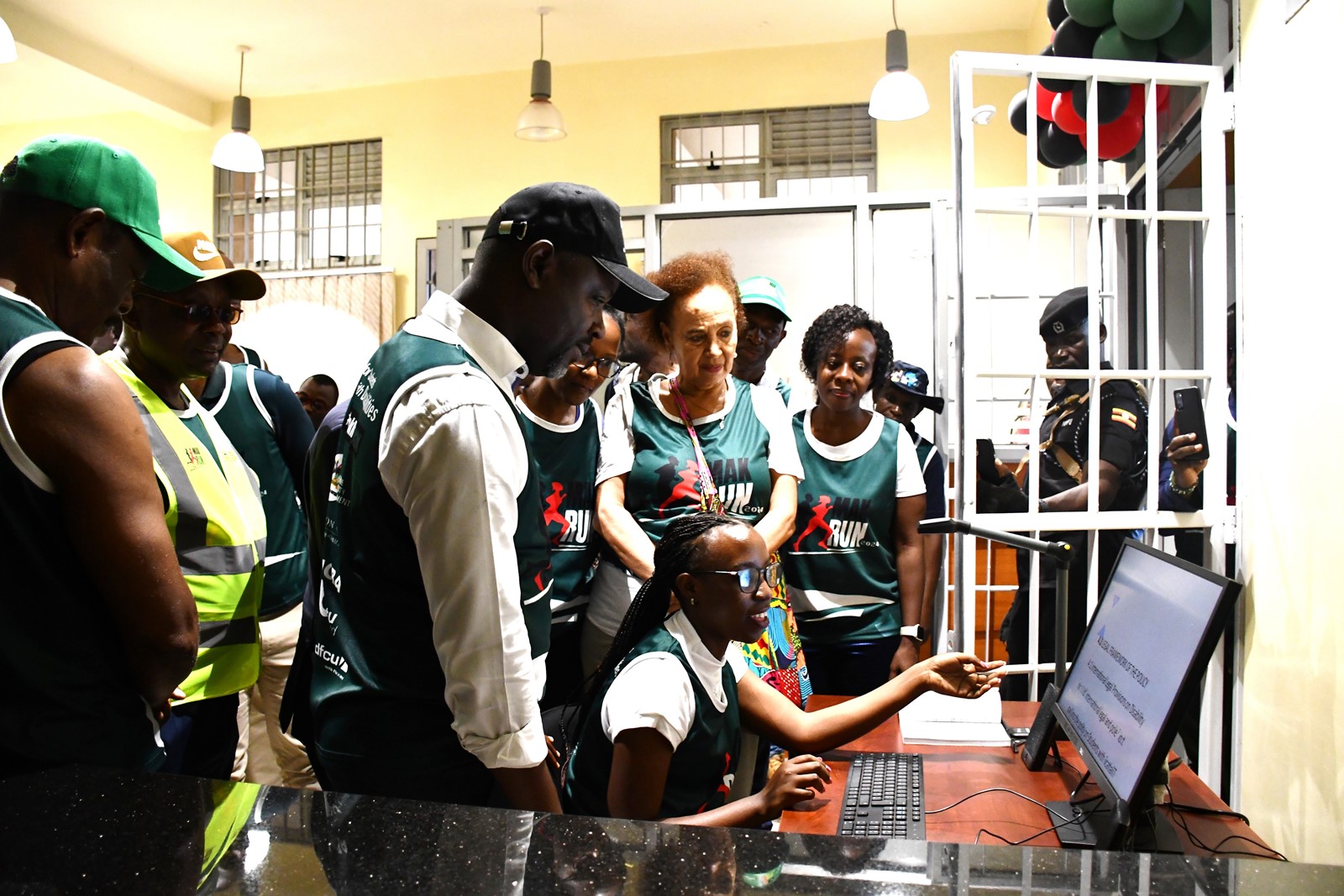
Students with disabilities at Makerere University have been requested to stop seeking for special attention and instead look for solutions and opportunities for personal growth.
This was during a mental wellness, inclusion and safeguarding session organized by the Dean of Students office and the Mastercard Foundation Scholars Program at Makerere University.
Addressing students on mental health and disability inclusion, Mr. Marvin Ggaliwango, a lecturer at the College of Computing and Information Sciences (CoCIS), noted that if the students stop complaining, they will become empowered to take charge of their own development, build resilience and engage confidently in both academic and social environments.
“Turn your lived experiences into tools for innovation. Stop complaining and start creating solutions for yourselves. You are the one living this life, and that gives you the authority to be an expert. When you develop a solution, it doesn’t just benefit you, it helps others too, by removing barriers,” Mr. Marvin Ggaliwango, said.
He encouraged students to see themselves not as victims of circumstance, but as active participants and co-creators of the inclusive environment they wish to experience.
“Learn how to communicate effectively and humbly. If you have a problem, express yourself clearly. Do not isolate yourself or feel resentful. You are not defined by disability, you may face disadvantages, but you still have ability,” he encouraged.
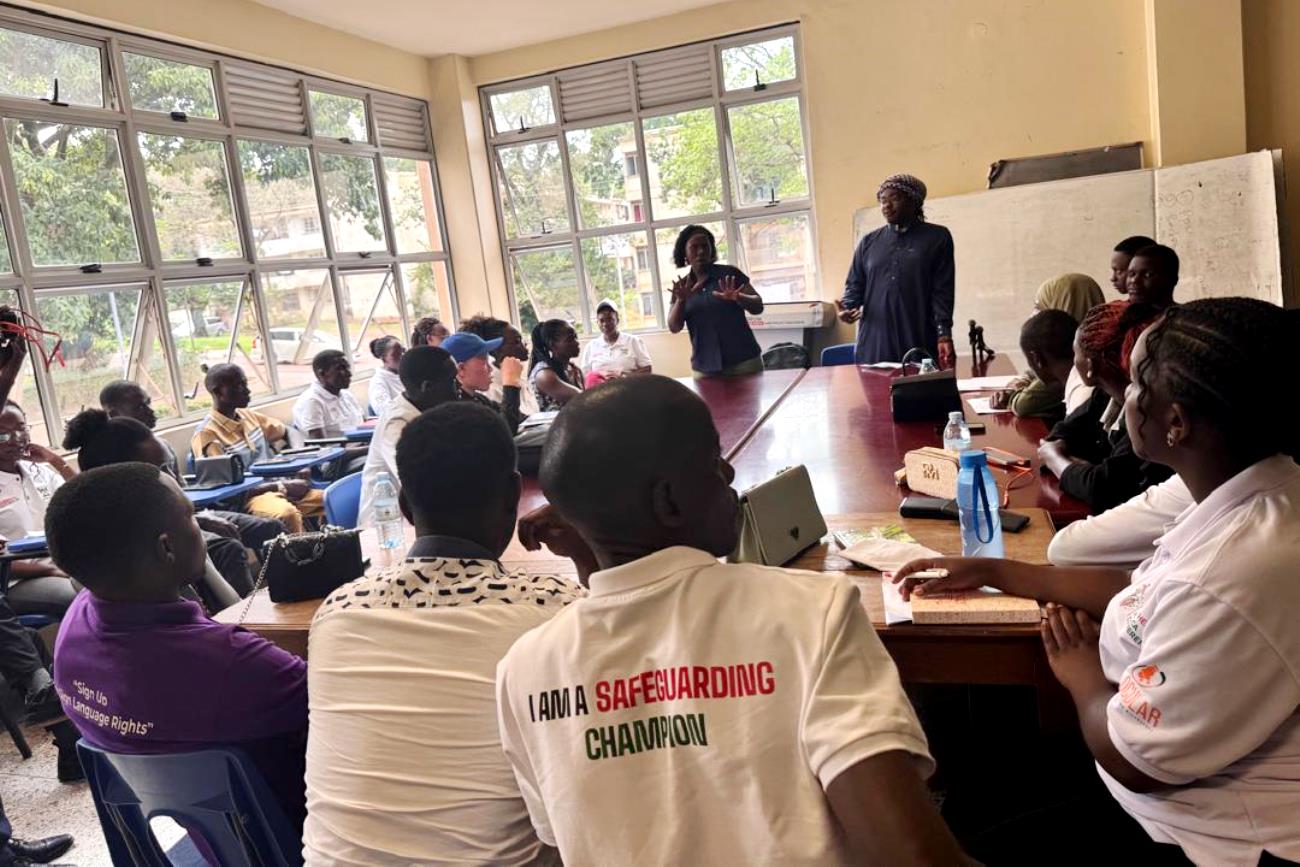
Throughout the session, students listened attentively as he emphasized the importance of self-awareness and personal responsibility, urging them to understand their strengths, acknowledge their limitations and take deliberate steps toward personal growth while contributing positively to the University community.
“We must enhance and ensure that our mental health is number one. Always choose yourself first. Choose what makes you happy and protect your peace. If you are at peace with yourself, your academics will improve. There is a strong link between mental wellness and academic success,” Mr. Ggaliwango, noted.
In his speech, Mr. Musa Mwambu, the Disability Inclusion Advisor at Light for the World Uganda, called upon the students with disabilities to enhance and ensure that their mental health is prioritized.
“As students living with disabilities, sometimes you over expect, because you have a disability you should be given, listened to and when people do not listen to you, you attribute it to your disability, get it from me, even those without disabilities are not listened too. Things are not happening to you because of your disability it is because of the world we live in. Everything that happens to you can happen to others,” Mr Mwambu, noted.
“Have fun with your life. Make yourself happy and be smart. Present yourself in public confidently wherever you go. The way you carry yourself can improve your mental health and how others perceive you,” Mr. Mwambu said.
He reminded the students that gaining admission to Makerere is itself a milestone.
“There are many people without disabilities who have never stepped at Makerere University. Find something that empowers you and hold on to it. You may have a physical impairment, but if you are brilliant in class, you can lead discussions and inspire others,” he added.

During the session, Dr. Rodney Rugyema, the Acting Principal Warden, welcomed the students back from the long holiday. He assured them that the University is committed to their safety and well-being while on campus.
Dr. Rugyema emphasized that the University has systems in place to protect students, both physically and psychologically and encouraged them to report any concerns promptly.
“When you are at the University, you are not on your own, we are always here for you. For us to engage you on mental wellness and inclusion, we want you to be in the right state of mind, whole and complete,” Dr Rugyema, said.
He added: “We are here to empower you and we are calling upon you not be a risk for yourself and always be able to detect risks that are likely to affect your mental health and works towards avoiding them and reporting them to ensure that the University manages them before they escalate into real harm whose impact is more serious than you can think,”
During the session, Ms. Diane Nabikolo Osiru highlighted the University’s broader commitment to safeguarding.
Safeguarding at Makerere University refers to measures put in place to promote safety and wellness of all students, staffs and other stakeholders.
“At Makerere University, safety is not a luxury for few. but it is a right for every student. As the semesters begins, we are urging you to learn how to identify signs of harm or abuses and report them to the appropriate safeguarding contact points,” Ms Nabikolo, said.
For support in case of any harm or abuse, International and Refugee Students, can access support through the Advancement and International Office, while Students with Disabilities, can utilize the Disability Support Center. Those with personal and emotional challenges, can visit the Counselling and Guidance Centre.
In his speech, Dr Joab Agaba, a Lecturer in the College of Computing and Information Sciences, guided students how to report risks and incidences to the MakSafeSpace, the e-reporting platform complimenting the other University traditional reporting channels.
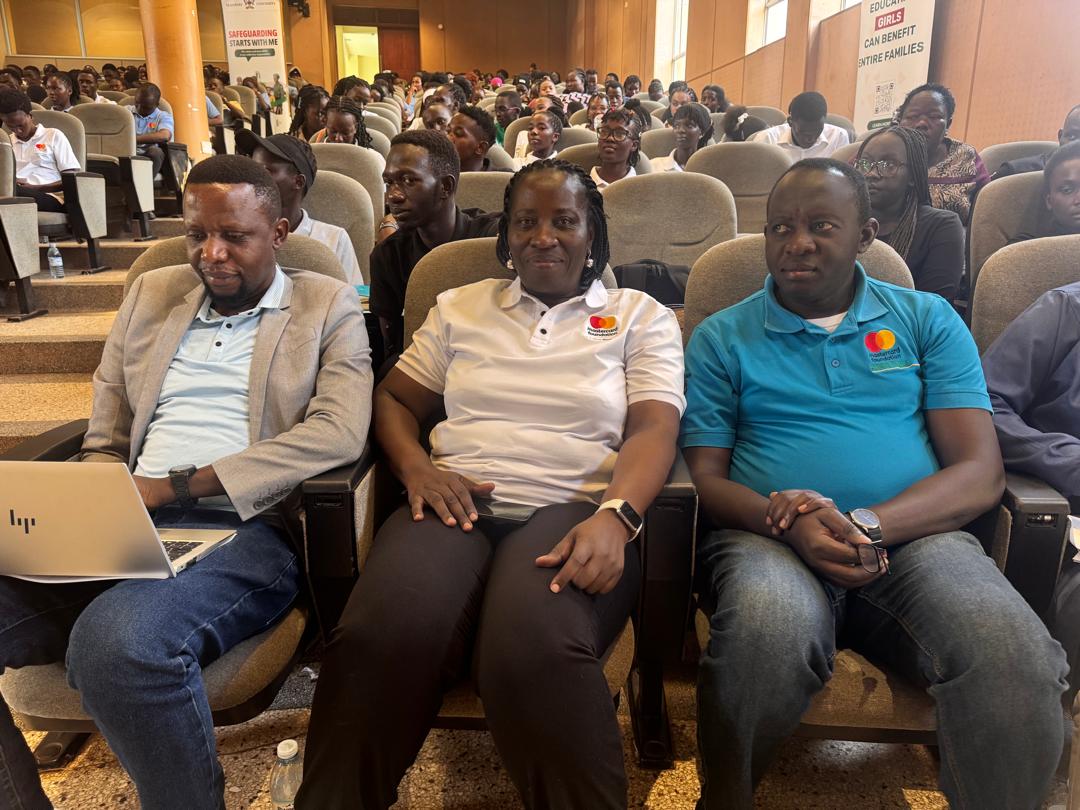
Mr. Henry Nsubuga, the Manager of the Counselling and Guidance Center, shared practical strategies for coping with stress effectively including time management, setting realistic goals, seeking support from peers or counsellors.
Students speak out
Shanitah Nahamya, 2nd year student of the Bachelor of Adult and Community Education
“I have learned how to respectfully and appropriately engage with students with disabilities. In the past, I often felt pity when I encountered them, but now I understand that what they need is not pity, it is respect, support, and equal opportunity.”
Guo Dorothy Geri, 1st year student of the Bachelor of Commerce
“I have learnt how to use inclusive language. Before offering help to a student with a disability, I will first ask them, because not all the time do they need our help. You might think someone wants to be helped to cross the road, yet they are waiting for someone.”
Valentines Doris Aduka, 1st Year student of the Bachelor of Biomedical Science
“I have been calling students with disabilities special names, thinking it was kind. But I have learned that they do not want to be treated differently or labeled in a special way. What they value most is being treated like everyone else, with respect, dignity, and fairness.”
Trending
-

 Humanities & Social Sciences1 day ago
Humanities & Social Sciences1 day agoMeet Najjuka Whitney, The Girl Who Missed Law and Found Her Voice
-

 Health6 days ago
Health6 days agoUganda has until 2030 to end Open Defecation as Ntaro’s PhD Examines Kabale’s Progress
-

 Agriculture & Environment4 days ago
Agriculture & Environment4 days agoUganda Martyrs Namugongo Students Turn Organic Waste into Soap in an Innovative School Project on Sustainable Waste Management
-

 General6 days ago
General6 days agoMastercard Foundation Scholars embrace and honour their rich cultural diversity
-

 Health2 weeks ago
Health2 weeks agoCall for Applications: Short Course in Molecular Diagnostics March 2026
